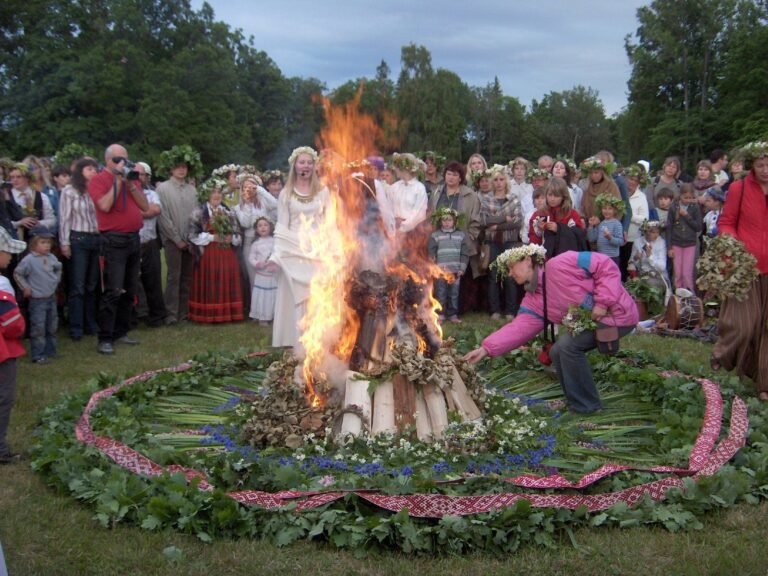Contenus
ToggleIn short
Jāņi is an annual Latvian festival. Celebration of the summer solstice. Although astronomically the solstice falls on June 21 or 22, the public holidays – Līgo Day and Jāņi Day – are June 23 and 24. The day before Jāņi is known as Līgosvētki.

Jāņi, the Latvian summer solstice
Fires (also known as pūdeļa, pundeļa, Jāņi candles and witches' burns) are lit and burned from sunset until the next morning. This practice reflects the belief that light from the fires will carry over into the following solar year. It is believed that fires should be burned at a high point in the landscape, from where the light of the fire bestows power and fertility on the fields and people upon which it shines. Jumping over fire is said to bring good luck and health throughout the coming year.
While fires are usually fueled with wood, tar barrels or tar wheels hoisted on poles are also burned.
Singing Līgo songs or Jāņi songs is associated with promoting fertility, acquiring good fortune and preventing calamities. Historically, the singing of Līgo songs began two weeks before Jāņi, reached its climax the day before, and lasted until Peter or Māras Day (August 15) – a period of about a month. After that, the singing of Līgo songs ceased until the following year.
Singing Ligo songs on Jāņi night begins after dinner and continues all night until sunrise, either by jumping over the fire or going from house to house. Singing visits to Jāņi were called aplīgošana, servants visited their masters, young girls visited young men and vice versa.
People drink beer and eat cheese, believing that this will promote the growth of barley and the production of cow's milk next summer. Singing visitors from neighboring houses are treated to cheese and beer.
There is a belief that on the morning of Jāņi, the milk witches ran over the dew and shouted: “All mine, all mine!” » If anyone heard it, they should respond with: “I slaughtered half of them!” » Then there would be no shortage of milk. Witches are believed to have disguised themselves as normal women by dressing in white robes and letting their hair down. When disguised, it is believed that they cast spells or curses on their enemies' fields and livestock.
It was believed that anyone who found a fern flower would gain wealth and happiness and learn the secrets of the past and future. “Whoever acquires the fern flower will be happy, because he can achieve whatever he wants. The flower is hindered by evil spirits and only a brave person can get it.” “On the night of Jāņi, jump eight times to eight on a broomstick, which is hoisted from the ground. During this time, don't talk or laugh. Once you've done so, jump onto the broomstick astride the nearest one. fern, but only by yourself, then you will see the flowering of a fern flower.
Circular wreaths made of flowers, herbs and oak leaves are woven and worn on the head. Different types of plants are used to make wreaths for males and females. Women and girls wear wreaths made of flowers, herbs and herbs. Braided wreaths of twenty-seven flowers and herbs are believed to prevent disasters and diseases and repel enemies. Men and boys wear crowns made of oak leaves, symbolizing the oak's physical strength. Oak wreaths were also thought to promise the blessing of horses and bees. Along with Jāņi cheese and fires, crowns are also symbols of the sun.
Social networks
Picture
